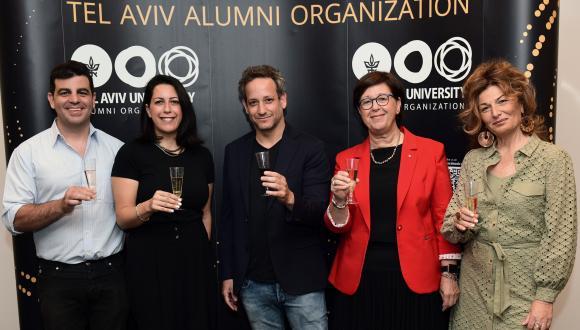Culinary and High Tech meet in the Academia
The Tel Aviv University Alumni Organization, Headed by Sigalit Ben Hayoun, held a meeting on the connection between the worlds of High Tech and Culinary.
The meeting was held at "ANU - Museum of the Jewish People", with the participation of
- Prof. Miriam Shefer Mossensohn, Head of TAU’s Zvi Yavetz School of Historical Studies
- Julia Zaher, CEO of Al-Arz Tahini, recipient of the 2022 Hugo Reminisciano Economics Award as part of Tel Aviv University's Board of Governors events, held during the May 2022
- Lana Zaher, VP of Business Development for Al-Arz Tahini, Alumna of the Kellogg-Recanati International Executive MBA Program at the Coller School of Management
- Nir Gal, Deputy CEO of Barkan Vineyards, Alumnus of the Coller School of Management
- And the Moderator of the event was Roy Yerushalmi, Gastronomist, Culinary Researcher, Alumnus of TAU’s Faculty of Humanities, and currently a doctoral student at TAU’s Zvi Yavetz School of Historical Studies.
During the event, the participants discussed issues related to technological developments and their effects on the Israeli food market in Israel and abroad, historical effects on the taste of Israeli market products and how to maintain leadership in a competitive international market for decades.
Sigalit Ben Hayoun opened by saying: "TAU Alumni are at the forefront of all fields of industry and are practically the driving force of the economy. Our ability to create a connection between different fields and interfaces constitutes a significant growth engine for the entire economy and puts a unique spotlight, especially on unusual combinations combinations - for example between culinary and industry."
Prof. Miriam Shefer Mossensohn stated that "the study of history allows us to think outside the box. Things that we take for granted today were not understood 20 years ago, let alone 200 years ago. Together with the departure from the ivory tower, study of the past combined with understanding of the present, allows us to make informed decisions going forward towards the future".
Roy Yerushalmi, a doctoral researcher of Culinary History, reviewed the change that has taken place in Humanities studies over the past two decades: "Alumni of the Faculty of Humanities leave here with exceptional analytical abilities, tools for expression and thinking outside the box. This uniqueness has not gone unnoticed by employers and senior managers - today everyone understands that there is business and occupational significance in studying the Humanities. When Amos Shapira was CEO of Cellcom, he said he was interested in alumni of the Faculty of Humanities. At the time it sounded like a joke, but today this thinking is completely normative and graduates of Philosophy and History are also in demand in the High-Tech industry and Business Consulting. There has also been a profound change in the curricula themselves, which have not frozen in time: Today at the School of Historical Studies at Tel Aviv University, researchers are engaged in fields such as History of Culinary, of Football and more."
Julia Zaher shared with audience the beginning of her career as Owner of the leading tahini brand, and the tribulations of the beginning:
"Anyone who dreams of doing something must remember that all beginnings are difficult. When I arrived at the factory 19 years ago, tahini was not a sought-after product and was certainly not an integral part of international cuisine. Our motto is that food connects people. We have never looked at the competitors but put our emphasis on quality. Since 1990 we have been using the same variety of sesame and producing the tahini with the same traditional production method. In 2015 we moved to a new factory and there was a debate about how to integrate the technology. We decided to continue to maintain the unique line and this is part of our international success. Today it is a family company, which invests in society, and it is important for us to promote disadvantaged populations, among them people with disabilities, the LGBTQ community, Encouraging women to enter the labor market and more."
Her daughter Lana Zaher stated that "over the years we have been able to promote our product - raw tahini - and establish it as an export industry. For years we were a niche at food exhibitions, but in recent years there has been a breakthrough in the perception of food, and suddenly tahini became a super food. Nowadays we are viewed as a healthy, sought-after food, which is served in restaurants all over the world. The USA is our largest market, where there’s a long-standing great demand, but we produce also for Europe and the Far East, where sesame has always been a sought-after flavor. We work a lot with Israeli chefs abroad, because tahini became a good base for any haute culinary cuisine. Tahini is popular all around the world today. Unfortunately, we cannot compete with the prices in Dubai or Jordan due to production costs, but the Israeli market has an advantage that also comes from the promotion of Israel’s great chefs."
Nir Gal, Deputy CEO of Barkan Vineyards spoke about the transformations that have taken place over the years in the Israeli wine market:
"In the beginning, the Israeli wine market was a fairly basic commodity market. In the 1990s, a revolution of quality began, focusing on popular international varietal wines.
At the beginning of the 2000s there was a further maturation and a greater emphasis on terroir in the preparation and marketing of the wine. Terroir is a word that expresses the character and uniqueness of the place where the wine is grown.
In the last decade we have undergone another evolution, and that is the search and promotion of local varieties. Ancient varieties have been found whose origins go back hundreds of years. Also, a number of wineries, led by Barkan, began to promote the scarlet variety that was developed in Israel in the 1970s. This promotion of local varieties is natural and important because wine is first an identity and a story with a cultural and historical context. In Israel you can find local varieties under the beta series, which is an experimental series of Barkan Vineyards, where we promote special projects.
In terms of exporting Israeli wine, 80% of it is for Jewish population outside of Israel, who are looking for both kosher and the connection to Israel as a place. The main challenge of the Israeli wine industry is to expand the target audience beyond the kosher world and to establish Israel as a wine country with a unique identity and quality. We see great interest among opinion leaders around the world in our local varieties and in stories that emphasize Israeli terroir."
Among the alumni who attended the event:
- Eran Ron, Founder and Chairman of Rinsberg Holding Ltd. and Co-owner of E.R.D.S. Group Ltd. who came with his wife, Politcian, Actor and TV Host Mehereta Baruch Ron
- Shmulik Bass, Senior Political Advisor at the Ministry of Foreign Affairs
- Oz Cohen, Deputy CIO & Director Product Management at the Knesset (the Israeli Parliament)
- Yigal Ben Aharon, Member of the national supervision team for business management trends in the Ministry of Education
- Eldad Kirchner, Legal Secretary at the Tel Aviv District Court
- Shuki Stauber, Author, Researcher, Consultant, Journalist & Senior Lecturer in the fields of Management, Labour and Career
and many more...
The event was sponsored by Barkan Vineyards and Al Arz Tahini




